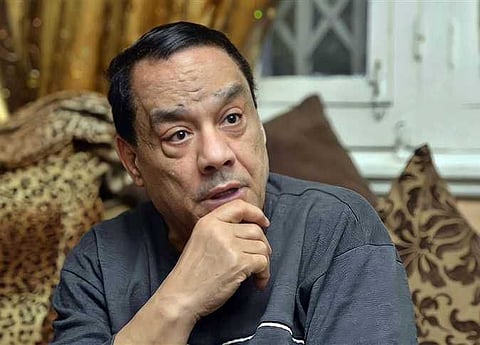Veteran Egyptian musician’s burial stymied over family dispute
Helmy Bakr is remembered for composing hundreds of songs for leading Arab performers

Cairo: A dispute among family members of celebrated Egyptian musician Helmy Bakr has temporarily hampered his burial.
Noted for composing hundreds of songs for Arabic performers, Bakr died on Friday due to health problems including kidney and heart disorders at a hospital in Al Sharqia governorate north of Cairo. He was 86.
Swift burial is recommended in Islam.
A dispute erupted between Bakr’s widow and his brothers over burial procedures, prompting transfer of his body into a hospital morgue in Cairo, according to local media.
The row capped a disagreement that earlier simmered between the two sides on medical treatment for Bakr. The dispute made local headlines and spilled over into TV nighttime talks. They have accused his wife Samah Al Qurashi of neglecting his treatment, an accusation that she has vehemently denied.
“A dispute happened on who should be in charge of Bakr’s body. His wife wanted to bury him, but his brothers refused this until his son arrives (from the US),” Khaled Bayoumi, a member of the Egyptian Musicians’ Syndicate, said.
The crisis led them to take the case to police, Bayoumi told independent newspaper Al Masry Al Youm.
Son’s request
Upon learning about his father’s death, Bakr’s son Hesham, who is a US-based businessman, requested he not be buried until his arrival in Egypt.
Hesham arrived in Cairo on Saturday evening and said in TV remarks that an official burial permit was issued on his behalf through a lawyer.
Bakr, who married several times, is also survived by an eight-year-old daughter.
He was due to be buried on Sunday afternoon in a family tomb in Cairo, the Musicians’ Syndicate said.
A self-styled advocate of Arabic classic music, Bakr is credited with composing around 1,500 songs for big-name Arab vocalists. They included Warda, Najat, Mohammed Rushdy, Asala and Medhat Saleh.
Bakr headed an audition jury at the Musicians’ Syndicates for around 40 years.
He also provided the scores of more than 100 films and stage shows. Additionally, he is remembered for the music of Al Fawazeer, TV riddle shows aired during the Muslim holy month of Ramadan in the 1980s and 90s.
Sign up for the Daily Briefing
Get the latest news and updates straight to your inbox



